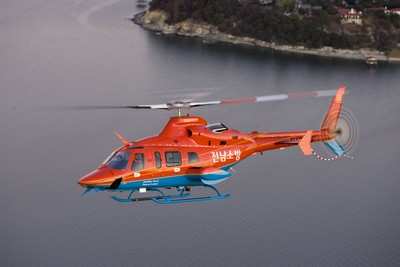AD 2021-24-09 Requires A Visual Inspection Of The M/R Clevis, Rod End, And A Certain Part-Numbered Universal Bearing
The FAA is adopting a new airworthiness directive (AD) for certain Bell Textron Canada Limited Model 430 helicopters.

This AD was prompted by an in-flight failure of the main rotor (M/R) pitch link clevis (clevis) due to fatigue damage and excessive wear. This AD requires a visual inspection of the M/R clevis, rod end, and a certain part-numbered universal bearing, performing a purge grease, and performing a magnetic particle inspection of each M/R clevis. Depending on the visual inspection and magnetic particle inspection results, this AD requires removing certain parts from service, replacing certain parts, and performing additional actions. This AD also requires recurring inspections of each M/R clevis and each universal bearing. The FAA is issuing this AD to address the unsafe condition on these products. This AD becomes effective December 7, 2021.
Supplementary Information: Transport Canada, which is the aviation authority for Canada, has issued Transport Canada AD CF-2021-26, dated July 26, 2021 (Transport Canada AD CF-2021-26), to correct an unsafe condition for Bell Textron Canada Limited Model 430 helicopters, serial numbers 49001 through 49129.
Transport Canada advises of an in-flight failure of an M/R clevis which resulted in loss of control of the helicopter and fatal injuries to occupants. Transport Canada further advises that the M/R clevis part number (P/N) 430-010-432-101 fractured at the exposed thread area above the nut, which was consistent with fatigue damage. Transport Canada also advises an inspection of the failed part determined universal bearing P/N 212-010-412-001 of the M/R pitch link assembly had excessive wear and increased resistance to rotation. Transport Canada states a similar accident previously occurred on the same model helicopter in which the M/R clevis was found to have fractured at the neck area due to fatigue damage. Transport Canada states the restriction in freedom of movement of the universal bearing can cause increased loads on the M/R pitch link assembly and subsequent fatigue failure of the M/R clevis prior to its life limit. Finally, Transport Canada advises the accident investigation is still ongoing.
This condition, if not addressed, could result in crack initiation at the M/R clevis neck or threaded area and failure of the M/R pitch link, resulting in loss of control of the helicopter.
Accordingly, Transport Canada AD CF-2021-26 requires visually inspecting the M/R clevis and rod end for wear and damage and performing corrective actions. Transport Canada AD CF-2021-26 also requires for certain part-numbered M/R rotor pitch link assemblies that have accumulated 5000 hours air time or less and have a universal bearing P/N 212-010-412-001 that is unserviceable, replacing the universal bearing. Transport Canada AD CF-2021-26 requires for certain partnumbered M/R pitch link assemblies that have accumulated more than 5,000 hours air time and have a universal bearing P/N 212-010-412-001 with signs of binding or stiffness, replacing both the universal bearing and the M/R clevis or if the universal bearing is unserviceable but there are no signs of binding or stiffness, replacing only the universal bearing.
Transport Canada AD CF-2021-26 requires performing a purge grease of each universal bearing and performing a magnetic particle inspection of the M/R clevis to detect cracks, replacing any M/R clevis with cracks, or if the M/R clevis does not have any cracks, replacing any missing cadmium plating.
Additionally, Transport Canada AD CF-2021-26 requires after the initial visual and magnetic particle inspections, performing recurring visual inspections of the M/R clevis for corrosion and mechanical damage and performing corrective actions as needed. Transport Canada AD CF-2021-26 also requires performing recurring visual inspections of the universal bearing for binding, stiffness, wear, damage looseness, excess axial and radial play, and performing corrective actions as needed.
Transport Canada AD CF-2021-26 requires reporting any cracks or M/R clevises that are beyond published limits to Bell Product Support Engineering. Transport Canada considers its AD an interim action and states that further AD action may follow.
 Airborne 10.15.25: Phantom 3500 Confounds, Citation CJ3 Gen2 TC, True Blue Power
Airborne 10.15.25: Phantom 3500 Confounds, Citation CJ3 Gen2 TC, True Blue Power Airborne 10.14.25: Laser Threat, VeriJet BK, Duffy Threatens Problem Controllers
Airborne 10.14.25: Laser Threat, VeriJet BK, Duffy Threatens Problem Controllers Aero-News: Quote of the Day (10.20.25)
Aero-News: Quote of the Day (10.20.25) ANN's Daily Aero-Term (10.20.25): Flameout Pattern
ANN's Daily Aero-Term (10.20.25): Flameout Pattern NTSB Final Report: Schweizer SGS 2-33A
NTSB Final Report: Schweizer SGS 2-33A



